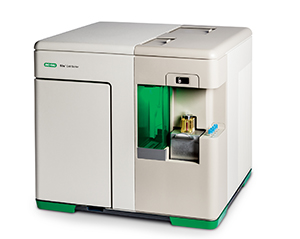Bio-Rad S3e
Bio-Rad S3e Cell Sorter
Laser lines488 nm; 561 nm
PMT Detectors4 Fluorescence detectors; Forward scatter (FSC); Side scatter (SSC)
Available TechniquesFlow Cytometry AnalysisFluorescence-Activated Cell Sorting (FACS)
Training is required before useAn equipment guide is available in our Guides sectionContact BIC for trainingSystem BookingLocation: 5.22 |
|
Warnings
- Before you get started for the first time in this cell sorter consult the responsible people for proper training
- For the moment, bacterial pathogens, cell lines or any other agent of Biosafety level 2 or higher are not allowed, as well as radioactively labeled or flammable samples
- Do not forget to check the fluidics before you start operating the cell sorter
- Use only MiliQ water in the water container
- It is recommended that resuspended adherent samples are mixed at high speed to prevent clumping
- Samples must be filtered prior to running. This will minimize clogs in the sample tube and nozzle tip
- Do not open the nozzle door
- Never try to access the laser beam paths
- Please confirm the bead lot before starting the quality control procedure. If the bead lot is not in the dropdown list, please refer to the responsible people
- Do not forget to register your utilization in the logbook. Remember that future maintenance costs and repairs will be supported by the groups according to the logbook data
- Perform a high-pressure cleaning protocols if you are the last user of the day. Otherwise, perform the low-pressure cleaning protocol
- Use only 70% ethanol and MiliQ water as cleaning solutions
- When the remaining running time is down to 5 minutes, the system will automatically shut down. The fluidics will need to be refilled and the start-up procedure must be performed. To prevent this, perform the fluidics “hot swap”
Brief Description
The S3e cell sorter is equipped with two lasers and four fluorescent detectors, plus both forward and side scatters. Samples are analyzed using the traditional jet-in-air technology, and events can be sorted at high speeds while maintaining sensitivity and high-purity.
The S3e cell sorter is largely efficient and user-friendly by automating the complex pre-sort set-up with a unique technology (ProDrop technology). In general, this cell sorter brings forward several automated features.
Suggestion for description in “Materials and Methods”
Flow cytometry data were acquired on a Bio-Rad S3e Cell Sorter and analyzed using the ProSort software, version 1.6.
Flow cytometry data were acquired on a Bio-Rad S3e Cell Sorter operated by the ProSort software, version 1.6, and analyzed using the Cytospec software from Purdue University Cytometry Laboratories.
Bacillus subtilis cells were sorted as alive GFP and dead GFP cells using a Bio-Rad S3e Cell Sorter operated by the ProSort software, version 1.6.
Suggestion for “Acknowledgements”
This work was partially supported by PPBI - Portuguese Platform of BioImaging (PPBI-POCI-01-0145-FEDER-022122) co-funded by national funds from OE - "Orçamento de Estado" and by european funds from FEDER - "Fundo Europeu de Desenvolvimento Regional".
Filter Sets
|
Laser |
Filter |
Emission Filter |
Fluorophore or Dye |
Fluorophore Excitation Maximum |
Fluorophore Emission Maximum |
|
488 |
FL1 |
BP 525/30 |
EGFP/GFP FITC Alexa Fluor 488 EYFP/YFP |
488 495 499 514 |
507 519 519 527 |
|
FL2 |
BP 586/25 |
PE RFP |
496, 565 554 |
578 584 |
|
|
FL3 |
BP 615/25 |
PI PE-Texas Red |
536 496, 565 |
617 619 |
|
|
FL4 |
655/LP |
PE-Cy5 PE-Cy5.5 PE-Cy7 |
496, 565 490, 565 496, 565 |
670 693 785 |
|
|
561 |
FL2 |
BP 586/25 |
PE tdTomato RFP DsRed |
496, 565 554 554 554 |
578 581 584 586 |
|
FL3 |
BP 615/25 |
mCherry PI PE-Texas Red |
587 536 496, 565 |
610 617 619 |
|
|
FL4 |
655/LP |
PE-Alexa Fluor 647 PE-Cy5 PE-Cy5.5 PE-Cy7 |
496, 565 496, 565 496, 565 496, 565 |
669 670 693 785 |
BP stands for a bandpass filter
LP stands for a longpass filter

